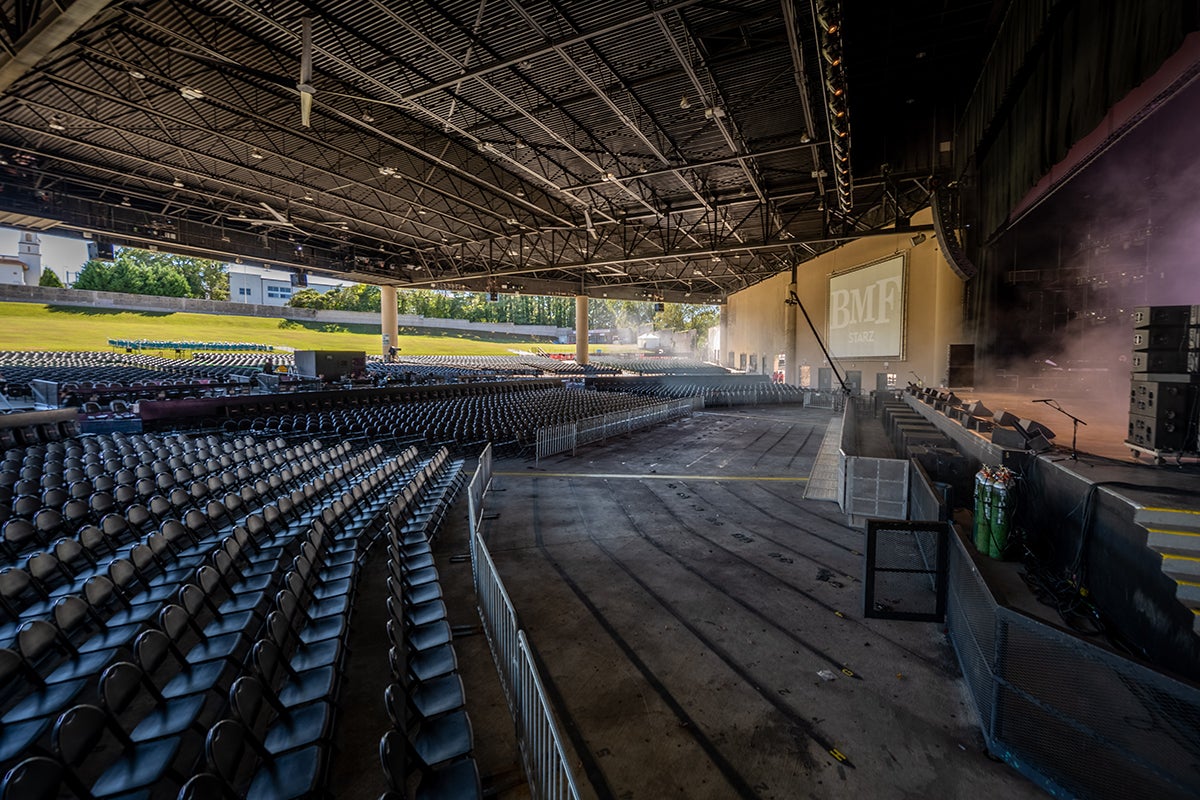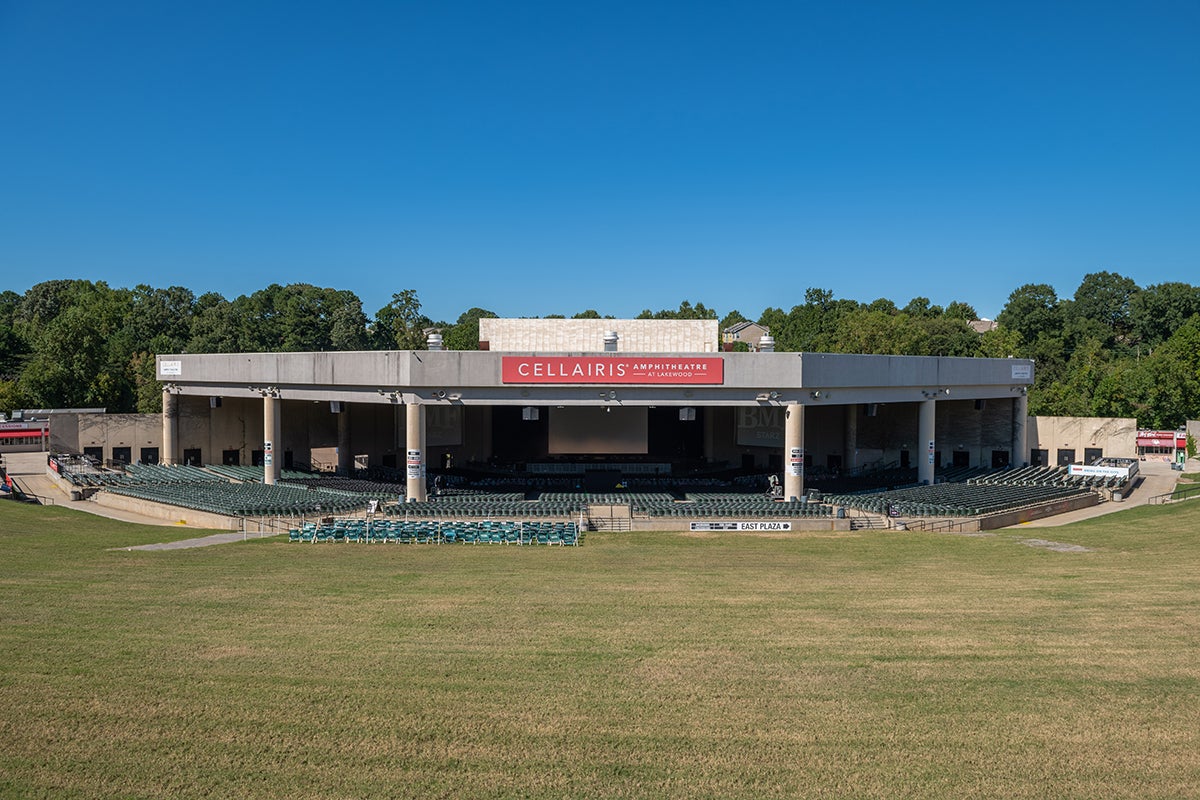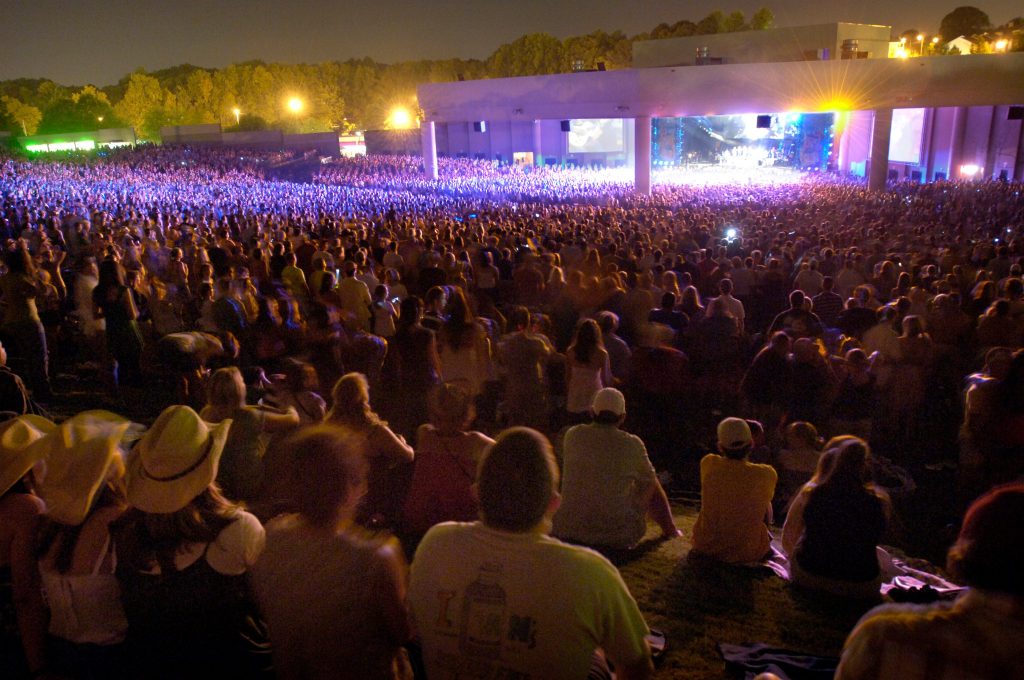Discover Its Former Name And Untold Stories
Lakewood Amphitheatre, originally known as the Lakewood Theatre, is a historic outdoor amphitheater located in Atlanta, Georgia, United States. It was built in 1924 and has hosted a variety of performances, including concerts, plays, and movies. The amphitheater was renamed in 1989 to reflect its primarily musical programming.
Lakewood Amphitheatre is a significant cultural landmark in Atlanta and has played an important role in the city's music scene. It has hosted some of the biggest names in music, including the Beatles, the Rolling Stones, and Bob Dylan. The amphitheater has also been used for political rallies and other public events.
Lakewood Amphitheatre is a popular destination for both locals and tourists. It offers a unique and intimate setting for live performances, and its beautiful surroundings make it a great place to spend an evening.
What Did Lakewood Amphitheatre Used to Be Called?
Lakewood Amphitheatre, originally known as the Lakewood Theatre, has a rich history and has played an important role in the Atlanta music scene. Here are eight key aspects of its transformation:
- Original Name: Lakewood Theatre
- Year Built: 1924
- Renamed: 1989
- Reason for Renaming: To reflect its primarily musical programming
- Significant Cultural Landmark: Yes
- Hosted Notable Performers: The Beatles, Rolling Stones, Bob Dylan
- Variety of Performances: Concerts, plays, movies
- Unique Setting: Intimate and surrounded by beautiful surroundings
These aspects highlight the evolution of Lakewood Amphitheatre from its origins as a theatre to its current status as a premier music venue. The renaming of the amphitheatre reflects its shift in focus, while its historical significance and cultural impact remain.
Original Name
The original name of Lakewood Amphitheatre, Lakewood Theatre, is an important aspect of its history and identity. The name "Lakewood Theatre" reflects the venue's original purpose as a theatre, hosting plays and other stage productions. Over time, the venue began to host more musical performances, and in 1989, it was officially renamed Lakewood Amphitheatre to better reflect its programming.
The connection between "Original Name: Lakewood Theatre" and "what did Lakewood Amphitheatre used to be called" highlights the evolution of the venue from a theatre to a music amphitheatre. The original name serves as a reminder of the venue's roots and the variety of performances it has hosted throughout its history.
Understanding the connection between the original name and the current name is important for appreciating the full history and significance of Lakewood Amphitheatre. It also provides insight into the changing nature of entertainment and the adaptability of venues to meet the needs of their communities.
Year Built
The year Lakewood Amphitheatre was built, 1924, is a significant aspect of its history and identity. The year 1924 marks the beginning of the venue's journey, and it provides important context for understanding its evolution and significance.
The construction of Lakewood Amphitheatre in 1924 reflects the growing popularity of outdoor entertainment venues during that era. The early 20th century saw a rise in the popularity of vaudeville, movies, and other forms of live entertainment, and Lakewood Amphitheatre was built to meet this demand. The year 1924 also coincides with the rise of Atlanta as a major cultural and entertainment hub in the southeastern United States.
Understanding the connection between "Year Built: 1924" and "what did Lakewood Amphitheatre used to be called" is important for several reasons. First, it provides historical context for the venue's development and evolution. Second, it highlights the changing nature of entertainment and the adaptability of venues to meet the needs of their communities. Third, it underscores the importance of preserving and celebrating historic landmarks like Lakewood Amphitheatre.
Renamed
The renaming of Lakewood Amphitheatre in 1989 marked a significant change in the venue's history and identity. Originally known as the Lakewood Theatre, the venue had primarily hosted plays and other stage productions. However, by the late 1980s, the venue had begun to host more musical performances, and the name change to Lakewood Amphitheatre better reflected its programming.
Overall, the renaming of Lakewood Amphitheatre in 1989 was a strategic move that reflected the venue's evolving identity and its commitment to providing a premier destination for live music in Atlanta.
Reason for Renaming
The reason for renaming Lakewood Amphitheatre to reflect its primarily musical programming is directly connected to the evolution of the venue's identity and purpose. Originally known as the Lakewood Theatre, the venue had primarily hosted plays and other stage productions. However, by the late 1980s, the venue had begun to host more musical performances, and the name change better reflected its programming.
The shift towards musical programming was a response to the changing entertainment landscape in Atlanta and the growing popularity of live music. By renaming the venue Lakewood Amphitheatre, the owners acknowledged this shift and positioned the venue as a premier destination for live music in the city.
Understanding the connection between "Reason for Renaming: To reflect its primarily musical programming" and "what did Lakewood Amphitheatre used to be called" is important for several reasons. First, it provides historical context for the venue's development and evolution. Second, it highlights the changing nature of entertainment and the adaptability of venues to meet the needs of their communities. Third, it underscores the importance of preserving and celebrating historic landmarks like Lakewood Amphitheatre.
Significant Cultural Landmark
The designation of Lakewood Amphitheatre as a "Significant Cultural Landmark" is closely connected to its history and identity. This designation recognizes the venue's architectural significance, its role in the development of Atlanta's music scene, and its enduring legacy as a beloved entertainment destination.
The amphitheatre's unique architectural design, with its distinctive Spanish Mission Revival style, has made it a recognizable landmark in Atlanta. Its open-air setting and intimate atmosphere have created a special ambiance that has attracted countless music lovers over the years.
Lakewood Amphitheatre's role in Atlanta's music scene cannot be overstated. It has hosted some of the biggest names in music history, including the Beatles, the Rolling Stones, and Bob Dylan. The venue has also played a vital role in nurturing local talent, providing a platform for emerging artists to showcase their music.
The designation of Lakewood Amphitheatre as a "Significant Cultural Landmark" is a testament to its enduring legacy and its importance to the city of Atlanta. It is a reminder of the venue's rich history, its architectural significance, and its role in shaping the city's cultural identity.
Hosted Notable Performers
The fact that Lakewood Amphitheatre has hosted notable performers such as The Beatles, The Rolling Stones, and Bob Dylan is closely connected to its identity and reputation as a premier music venue. These iconic artists have played a significant role in shaping the venue's history and legacy.
The Beatles' performance at Lakewood Amphitheatre in 1965 was a major event in the venue's history. It was one of the band's last concerts before they stopped touring, and it helped to cement Lakewood's reputation as a top destination for live music. The Rolling Stones also performed at Lakewood Amphitheatre in 1965, and their energetic performance is still remembered by fans today. Bob Dylan's performance at the venue in 1969 was part of his legendary "Nashville Skyline" tour, and it helped to introduce his new country-folk sound to a wider audience.
The presence of these notable performers at Lakewood Amphitheatre has had a lasting impact on the venue's identity. It has helped to attract other big-name artists to the venue, and it has contributed to Lakewood's reputation as one of the best places to see live music in Atlanta. The venue's association with these iconic performers has also helped to preserve its historical significance and cultural legacy.
Variety of Performances
The variety of performances hosted at Lakewood Amphitheatre, including concerts, plays, and movies, is closely connected to its identity and evolution as a performing arts venue. This diversity showcases the venue's adaptability and its commitment to providing a wide range of entertainment options to the Atlanta community.
In its early years as the Lakewood Theatre, the venue primarily hosted plays and other stage productions. However, as the popularity of live music grew, the venue began to incorporate concerts into its programming. This shift was reflected in the venue's renaming to Lakewood Amphitheatre in 1989. Today, the venue hosts a mix of concerts, plays, and movies throughout the year, catering to diverse audiences and tastes.
The variety of performances offered at Lakewood Amphitheatre has contributed to its enduring popularity and success. By offering a diverse range of entertainment options, the venue has attracted a wide audience and established itself as a cultural hub in Atlanta. The venue's commitment to presenting high-quality performances has also helped to maintain its reputation as a premier destination for live entertainment.
Understanding the connection between "Variety of Performances: Concerts, plays, movies" and "what did Lakewood Amphitheatre used to be called" provides insights into the venue's historical development and its role in the Atlanta arts scene. It also highlights the importance of adaptability and diversity in the entertainment industry.
Unique Setting
The unique setting of Lakewood Amphitheatre, with its intimate atmosphere and beautiful surroundings, is closely connected to the venue's identity and appeal. This setting has played a significant role in shaping the venue's history and legacy.
The amphitheatre's intimate atmosphere is created by its relatively small size and its open-air design. This allows for a close connection between performers and audience members, creating a more personal and engaging experience. The beautiful surroundings, including the venue's location in a wooded area and its proximity to a lake, add to the amphitheatre's charm and provide a picturesque backdrop for performances.
The unique setting of Lakewood Amphitheatre has been a major factor in its success and popularity. The intimate atmosphere and beautiful surroundings have helped to create a memorable and enjoyable experience for concertgoers. This has contributed to the venue's reputation as one of the best places to see live music in Atlanta.
Understanding the connection between "Unique Setting: Intimate and surrounded by beautiful surroundings" and "what did Lakewood Amphitheatre used to be called" provides insights into the venue's historical development and its role in the Atlanta arts scene. It also highlights the importance of setting and atmosphere in creating a successful and memorable live music experience.
FAQs on Lakewood Amphitheatre's History
This section addresses frequently asked questions about Lakewood Amphitheatre's history and evolution.
Question 1: What was Lakewood Amphitheatre originally called?
Answer: Lakewood Theatre
Question 2: When was Lakewood Amphitheatre built?
Answer: 1924
Question 3: Why was Lakewood Amphitheatre renamed?
Answer: To reflect its primarily musical programming
Question 4: Is Lakewood Amphitheatre considered a significant cultural landmark?
Answer: Yes, it is recognized for its architectural significance, role in Atlanta's music scene, and enduring legacy
Question 5: Has Lakewood Amphitheatre hosted any notable performers?
Answer: Yes, including The Beatles, The Rolling Stones, and Bob Dylan
Question 6: What types of performances have been held at Lakewood Amphitheatre?
Answer: Concerts, plays, and movies
These FAQs provide a concise overview of Lakewood Amphitheatre's rich history and its significance as a cultural landmark in Atlanta.
Transition to the next article section: Exploring Lakewood Amphitheatre's architectural design and its impact on the Atlanta cityscape.
Tips for Researching "What Did Lakewood Amphitheatre Used to Be Called"
Understanding the history of Lakewood Amphitheatre can provide valuable insights into its significance as a cultural landmark. Here are some tips for conducting effective research on this topic:
Tip 1: Explore historical archives and local libraries. Local archives and libraries often have a wealth of information on the history of their communities, including materials on Lakewood Amphitheatre. These resources may include old photographs, newspaper articles, and other documents that can provide valuable context for your research.
Tip 2: Visit the Lakewood Amphitheatre website and social media pages. The official website and social media pages of Lakewood Amphitheatre often contain historical information, upcoming events, and other relevant details. These platforms can be a great starting point for your research.
Tip 3: Interview individuals involved with Lakewood Amphitheatre. If possible, try to interview people who have been involved with Lakewood Amphitheatre over the years, such as former staff members, performers, or audience members. Their firsthand accounts can provide valuable insights into the venue's history and evolution.
Tip 4: Consult books and academic journals. There may be books or academic journals that have been written about Lakewood Amphitheatre or the Atlanta music scene. These publications can provide in-depth analysis and historical context for your research.
By following these tips, you can gather a comprehensive understanding of Lakewood Amphitheatre's history and its significance as a cultural landmark in Atlanta. This knowledge can enhance your appreciation for the venue and its ongoing role in the city's arts and entertainment scene.
Transition to the article's conclusion: Concluding thoughts on the importance of preserving and celebrating Lakewood Amphitheatre's rich legacy.
Conclusion
Through its journey from Lakewood Theatre to Lakewood Amphitheatre, this iconic venue has played a pivotal role in Atlanta's cultural landscape. Its diverse programming, intimate setting, and beautiful surroundings have made it a beloved destination for live entertainment.
As we reflect on the history of "what did Lakewood Amphitheatre used to be called," we recognize the venue's enduring legacy as a cultural landmark. Its evolution over the decades mirrors the changing entertainment landscape and the city's vibrant arts scene. Lakewood Amphitheatre stands as a testament to the power of live performance and the importance of preserving historic venues.
Unveiling The Secrets Of Adrian Mannarino's Tennis Mastery
Dive Into The World Of Nick Jonas: Exclusive Insights And Hidden Gems On Instagram
Unveiling The World Of Rose Bertram: Discoveries And Insights

Lakewood Amphitheatre 2023 show schedule & venue information Live

Lakewood Amphitheatre 2023 show schedule & venue information Live

Venue Guide Cellairis Amphitheatre at Lakewood Atlanta, GA
ncG1vNJzZmiakaGyr8DDnmWapaNoe6W1xqKrmqSfmLKiutKpmJydo2OwsLmOsJ%2BarF2ZtqV5y5qinq%2BfpLFurcypn6KsmJqutb7EZqysnZRiwbB5wZ5knJmcobKlesetpKU%3D